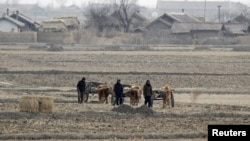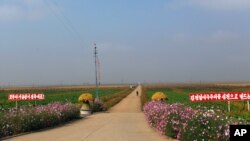North Korea may soon allow farmers to keep more of their produce, in a move to increase agricultural production. It would be a major reform by the country's young new leader, Kim Jong Un, who has promised to boost North Korea's ailing economy.
News of the possible plan comes from sources close to North Korea's agricultural sector, who spoke with Western news agencies.
Reports say a major economic announcement is expected Tuesday at a rare meeting of the country's Supreme People's Assembly.
North Korea is one of the most secretive states in the world - but there is speculation the agricultural reform plan could be announced at that meeting.
Currently farmers in North Korea are required to turn over most of their produce to the state, keeping only what they need for their families. Reports say under proposed reforms, farmers will be allowed to keep a much larger portion - which they could sell in the market, giving them an incentive to produce more.
North Korea's agricultural sector has struggled to produce enough food for the country's 24 million people.
Mr. Kim took power in December, following the death of his father Kim Jong Il, who tightly ruled the isolated nation for 18 years.
News of the possible plan comes from sources close to North Korea's agricultural sector, who spoke with Western news agencies.
Reports say a major economic announcement is expected Tuesday at a rare meeting of the country's Supreme People's Assembly.
North Korea is one of the most secretive states in the world - but there is speculation the agricultural reform plan could be announced at that meeting.
Currently farmers in North Korea are required to turn over most of their produce to the state, keeping only what they need for their families. Reports say under proposed reforms, farmers will be allowed to keep a much larger portion - which they could sell in the market, giving them an incentive to produce more.
North Korea's agricultural sector has struggled to produce enough food for the country's 24 million people.
Mr. Kim took power in December, following the death of his father Kim Jong Il, who tightly ruled the isolated nation for 18 years.







